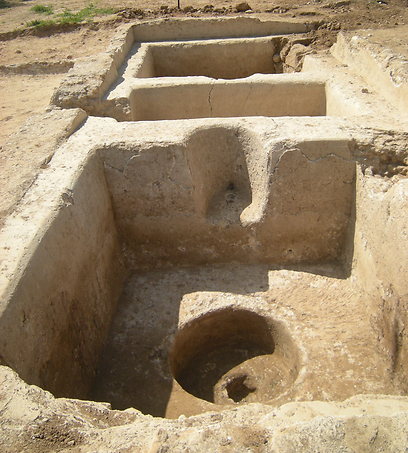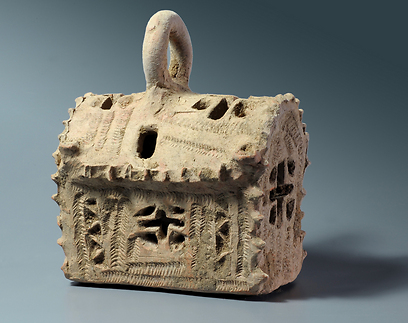The salvage excavation was conducted prior to the construction of a garden for outdoor events by the Shevet Ahim group, led by the Yifrah Brothers Company. The archaeological site will be incorporated in the projected garden.
According to Dr. Rina Avner, the excavation director on behalf of the Israel Antiquities Authority, "The winepress exceeded 100 square meters (1,076 square feet) in area. It consists of a large treading floor, surrounded by six compartments on the north and east. These compartments were used for fermenting grapes upon their arrival from the vineyards to produce high-quality wine.

Produced high-quality wine (Photo: Saar Ganor, courtesy of Israel Antiquities Authority)
"The treading floor slopes to the west, where a settling vat and two collecting pits are situated in a row. A led pipe connects between the treading floor and the settling vat, which in turn is connected by two led pipes to the two collecting pits.
"In the center of the treading floor is a depression, intended for a screw press. This device would allow applying further pressure to the grape remains from the compartments and thus, to produce vinegar and low-quality wine, mentioned in rabbinic sources as 'paupers' wine.'"
The owner of the winepress was likely Christian, as attested by a ceramic lantern found nearby, which was decorated with five crosses. The lantern has the shape of a miniature church building; an oval opening on one side served to insert an oil lamp.

Design of palm branches (Photo: Clara Amit, courtesy of Israel Antiquities Authority)
The other sides of the lantern were decorated in geometric patterns, creating a design of palm branches. The crosses adorned the walls of the lantern, so when the lantern was lit, crosses were projected on the walls and the ceiling.
Sa'ar Ganor, the Ashkelon district archaeologist of the Israel antiquities Authority, pointed out that "the winepress at Hamei Yoav, as well as three similar winepresses unearthed nearby, are located along the ancient road that led from Beth Guvrin to ancient Ashkelon and its port, thus facilitating the transportation of wine to Ashkelon, and its exportation from the port of Ashkelon to Europe and North Africa.
"The winepress will undergo conservation and will be incorporated in the modern complex of the garden, near the spa of Hamei Yoav."















